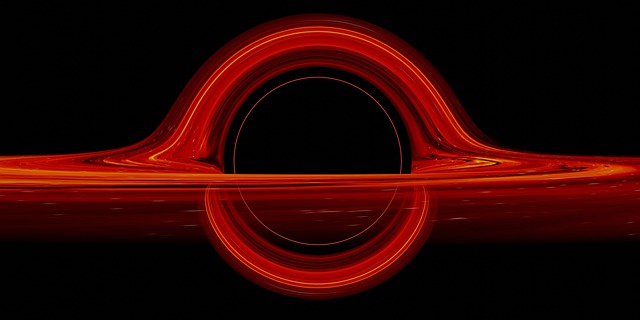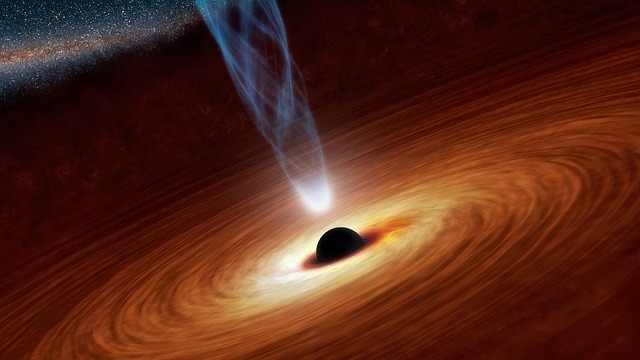*This post may contain affiliate links. This means we may make a commission if you purchase an item using one of our links*
Black holes are one of the greatest mysteries in the universe, sucking anything close by into their massive gravitational pull. But nothing lasts forever, and even black holes die one day. As Hawking radiation escapes the event horizon of these entities, they evaporate a little bit, and so begins a prolonged death.
Black holes are the remnants of a dying star, so their “life” and death cycle could be considered one and the same. Continue reading to discover how long a black hole lasts and what happens when these giants of the universe finally cease to be.
How Long Will A Black Hole Last For?
Table of Contents
Using the black hole evaporation formula, we can calculate the time different sized black holes will take to evaporate.
A modest black hole – around five times the Sun’s mass – would take around 2.6 * 10^69 years to dissolve. In comparative terms, that is about 190 billion trillion trillion trillion trillion times the age of our universe as it currently stands – an unfathomably long amount of time.
Scientists estimate that the black hole residing at the center of our galaxy is around four million times the Sun’s mass and would take 1.34 * 10^87 years to dissolve. This is 50 quadrillion times more than the black hole, which possesses five times the Sun’s mass. At this point, the time scale for such as event becomes pretty incomprehensible to us.
The most massive black hole that we know about is around 66 billion solar masses. For a black hole of this mass to dissolve, it would take 6 * 10^99 years – or 0.6 googol years – to evaporate, which is 4.5 trillion times as long as the black hole in the center of our galaxy.
To understand the sheer mass of a black hole and how it impacts evaporation length, we can compare the stats to more human-sized objects. Hypothetically, if a black hole had the mass of a passenger airplane, it would take around two years to dissolve; a black hole with the mass of a blue whale only one second!
It’s important to state that these figures are based on the best theories of scientists to date, but there are no known truths about the death of a black hole because the universe is not yet old enough to have ever been witness to such an event.
How Would A Black Hole Die?

Black holes are uncompromising entities that consume anything in their path. Once you fall in, you don’t come back out, not even if you’re a light particle – the fastest moving object in the universe.
But everything has a weakness, and the same is true of black holes. Stephen Hawking proposed the Hawking Radiation theory, which states that a black hole will glow, albeit very dimly, and dissolve over time. But how?
Space is filled with an abundance of virtual particles, which are pairs that pop into and out of existence using energy from a vacuum. This energy allows the pair to exist for the briefest of moments before they collide with each other and cease to exist once more.
But here’s the thing, every now and again, a pair of virtual particles pop into existence close to an event horizon. When this happens, one particle can fall into the event horizon while the other is left free to escape as a regular particle.
To separate a virtual particle pair, the black hole relinquishes some of its own mass and appears to glow. Over time, this causes the black hole to dissolve.
In quantum field theory, every type of particle possesses a field that permeates all of spacetime, and these fields are active. If you could remove all of the particles from an area of space, you would still have numerous quantum fields present. And in a vacuum, such as a black hole, these quantum fields persist.
Sometimes the fields will wiggle, but other times these attempted wiggles fizzle out. A quantum field will still have a slight wobble even in its lowest energy state.
When a black hole forms, it can trap a number of these fizzling quantum fields, while other fields that fizzle close to the event horizon can escape. Due to the time dilation from the intense gravity of a black hole, it appears that they emerge far later in the future.
It looks like the black hole is glowing and emanating light particles, but in reality, we are observing quantum fields that vibrate near the event horizon as the black hole forms. These fields have gained the energy needed for movement and thus become true particles.
Hawking Radiation may be less about virtual particles popping into and out of existence and more about the complex interactions of particle fields during the birth of a black hole. Either way, the best theory suggests that a black hole will eventually dissolve.
What Would Happen Once A Black Hole Dies?
Hawking radiation theory states that black holes have a finite life thanks to their emissions.
When a black hole dissolves, it begins to shrink and lose its mass. This happens in a gradual and slow process. The rate at which particles escape increases as the black hole loses its mass. In the last one-tenth of a second of a black hole’s life, it expels all remaining energy.
Black holes are one of the most imposing entities in the universe, and their death is as magnificent as their life. The release of energy in the last millisecond would be a reaction similar to a million nuclear bombs exploding within a small space.
Why Do Bigger Black Holes Take Longer To Die?

The formula representing the evaporation rate of a black hole is a complex one, but we can say it in simple terms: the time it takes for a black hole to dissolve is proportional to its mass (the more mass, the longer the death).
How long a black hole lasts depends on its mass. The greater mass a black hole possesses, the longer it will take to evaporate.
While the black hole continues to gain mass, there is no chance of it dissolving anyway. But once it begins to expel energy, it can start to lose some of its mass, and evaporation begins.
The greater the mass, the more energy there is to expel – hence, the process takes a much more significant amount of time.
Summary
It’s impossible to accurately describe the precise death of a black hole when it’s an unprecedented event in the universe as we know it. Using Hawking radiation theory, we can make a pretty good estimate of the time frame of his occurrence.
And in a death that’s as spectacular as its life, the massive explosion to signify the end of a black hole would be quite a spectacle to witness, with the power of a million nuclear bombs.
References
https://www.space.com/34281-do-black-holes-die.html
https://astronomy.com/magazine/news/2021/02/the-beginning-to-the-end-of-the-universe-how-black-holes-die
https://www.quora.com/How-long-does-a-black-hole-last
https://www.forbes.com/sites/quora/2017/06/30/what-happens-when-a-black-hole-dies/?sh=5c9ecb3d6f6f
https://astronomy.com/magazine/news/2021/02/the-beginning-to-the-end-of-the-universe-how-black-holes-die#:~:text=As a black hole evaporates,and energy,” Natarajan says.

